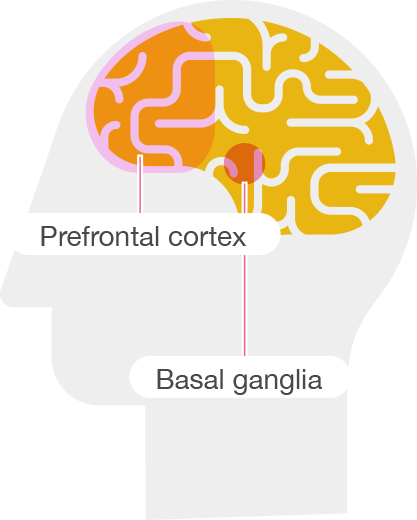What is the root cause of ADHD?
 Medical studies have shown that there are important developmental, structural and functional differences between the brains of people with and without ADHD. The development of the brain cortex (the surface area of the brain that plays a key role in memory, attention, thought and language) develops differently in children with ADHD. These areas are important for memory and for controlling behaviour.
Medical studies have shown that there are important developmental, structural and functional differences between the brains of people with and without ADHD. The development of the brain cortex (the surface area of the brain that plays a key role in memory, attention, thought and language) develops differently in children with ADHD. These areas are important for memory and for controlling behaviour.
In children with ADHD, the prefrontal cortex and the basal ganglia in the brain, along with certain other areas, are different from those without ADHD. Two chemical messengers or neurotransmitters – noradrenaline and dopamine – normally connect the prefrontal cortex and the basal ganglia. Lower levels of these messengers result in poor connections between these areas leading to the altered brain functioning found in people with ADHD.
So, your child isn’t ‘naughty’ or badly behaved: their brain differences mean that they genuinely struggle with certain tasks.
- The prefrontal cortex is responsible for planning, starting and carrying out actions, as well as correcting errors, avoiding distractions and being flexible when needed
- The basal ganglia is responsible for impulse control. It coordinates information coming from other regions of the brain to avoid automatic responses to stimuli, such as loud noises

If the prefrontal cortex is not able to function and process essential tasks, this can affect attention, alertness and memory, resulting in the symptoms of ADHD.
Poor focus
- An inability to start and continue activities
- Reduced short-term memory
- An inability to block appropriate responses
Difficulty planning complex activities
- Reduced ability to organise
- Increased physical activity
- Increased impulsiveness
Along with some challenges, the differences in your child’s brain may also mean they’re energetic, creative and inventive. Some children are able to hyperfocus on things they like; many have a great sense of humour and are able to solve complex problems.
ADHD symptoms may vary from person to person, so it can be hard to diagnose. A diagnosis should be made by a mental health specialist or other qualified healthcare professional. In some cases, your general practitioner (GP) or paediatrician may refer you to a psychiatrist.
Useful Links
Patient support organisations
- ADHD Foundation – Parents and carers – https://adhdfoundation.org.uk/
- ADHD Solutions – https://www.adhdsolutions.org/
- The National Attention Deficit Information and Support Service (ADDISS) – https://www.addiss.co.uk
- Scottish ADHD coalition – https://www.scottishadhdcoalition.org
Professional organisations
- National Health Service – Overview ADHD – https://www.nhs.uk/conditions/attention-deficit-hyperactivity-disorder-adhd/
- Royal College of Psychiatrists – ADHD for parents and carers - https://www.rcpsych.ac.uk/mental-health/parents-and-young-people/information-for-parents-and-carers/attention-deficit-hyperactivity-disorder-and-hyperkinetic-disorder-information-for-parents-carers-and-anyone-working-with-young-people
- National Institute for Health and Care Excellence (NICE) guideline NG87 – Information for the public – https://www.nice.org.uk/guidance/ng87/informationforpublic
You are now leaving www.adhdandyou.co.uk. You will be re-directed to an external website. Takeda accepts no responsibilty for the content of other websites.